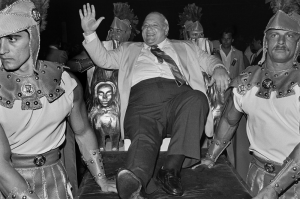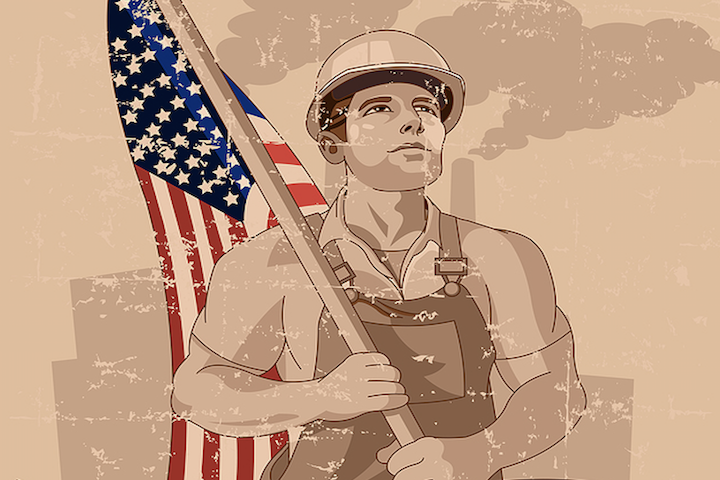“Conscience… that stuff can drive you nuts!” – Terry Malloy (played by Marlon Brando) in On the waterfront.
Eight-Academy Award-winning movie, On the waterfront, is the celebrated story about crime and corruption in a New Jersey longshoreman’s union. Despite being made nearly 70 years ago now, in 1954 – what was depicted then as fiction is apparently still true today.
I recently wrote about the great unions paradox – how their membership is continuing to decline despite the overwhelmingly favorable conditions that should, by all counts, lead to increases in membership.
But perhaps it’s not such a mystery after all, because it seems that unions are popular as a concept but unpopular when people are asked about joining one.
Image versus reality
The image most people have of unions is of the picket line; thousands of workers striking for higher pay, and better working conditions, garnering the toots of support from people passing in their care.
And, to be fair to the unions, there was indeed a time when they truly were fighting, in every sense of the word, for their members.
The best example is an incident in May 1937, known as the Battle of the Overpass, when security forces of the Ford Motor Company attacked a UAW rally in Dearborn, severely beating the men and women there.
The Augean stables
But despite all the supposed good unions claim to do for their members, they are also very good at poorly managing their members’ money and being rife with corruption.
The picture of union leaders being assaulted by Ford Security is considered emblematic of what unions represent.
But another picture that doesn’t get nearly as much attention is one of Teamsters president, Jackie Presser, being carried into a party by men dressed as Roman soldiers.

The picture was taken at a gala event that was part of the union’s annual convention in 1986. The symbolism was obvious: the union president was akin to an emperor, and apparently was to be treated as one.
At the time, Presser was the fourth Teamster president of the last five to be indicted for corruption, and the third elected while facing criminal charges.
The Teamsters have a storied past, starting with Jimmy Hoffa, who turned the union into a laundromat for mob money.
Since then more than a hundred Teamsters officials have been convicted of crimes including fraud, bribery and extortion.
And they’re hardly alone in being associated with organized crime. The Department of Labor’s Office of the Inspector General opens about a hundred labor-racketeering cases every year.
The federal government frequently takes over entire union locals, placing them under trusteeship in order to remove them from influence by criminal organizations.
Examples of malfeasance by union officials are commonplace. Last year, a federal investigation of the UAW found widespread corruption. A dozen senior officials, including two former presidents, were convicted of embezzling more than five million dollars in union funds for luxury travel and other lavish personal expenses.
In August this year the former president of one of the largest police unions was convicted of stealing $600,000 from a fund made up of contributions from members.
The causes of corruption
Much of the reason why corruption in unions is endemic is structural.
Most unions typically have a monopoly over the workers they represent.
That is, there is no competition from other unions to represent the same workers.
This gives a union total control over large sums of money collected from union dues. The money is intended for pensions, insurance, strike funds, political action, and administration. But oversight is frequently poor for the financial activities engaged in by unions.
Unions in the AFL-CIO have over 2,100 pension funds. Multiple analyses of these have shown the majority are poorly funded and managed. There are also several thousand health and insurance plans.
The sheer size of the funds and plans and the number of middlemen involved create vast opportunities for graft and embezzlement.
What can be done?
Of course, the above doesn’t explain why union members keep electing leaders who are working on a sequel to The Sopranos or can’t keep their hands out of the till.
But, cleaning these Augean stables may be a challenge even for Hercules.
Reducing corruption would require fundamental changes to labor law, such as removing the provisions that give a union monopoly representation.
Unions could be required to disclose performance measures.
That would open the door to having rival unions compete for workers.
But such changes are unlikely to happen.
So what remains is requiring more transparency of financial activities and more independent oversight.
The continuing decline of unions may well be the result of the public losing faith in them as a vehicle for improving the lot of workers because of the facts mentioned above.
If that doesn’t change then unions may well end up where most things do – on the ash heap of history.
